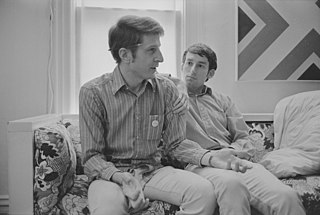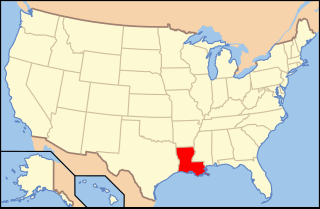Related Research Articles

The availability of legally recognized same-sex marriage in the United States expanded from one state (Massachusetts) in 2004 to all fifty states in 2015 through various court rulings, state legislation, and direct popular votes. States each have separate marriage laws, which must adhere to rulings by the Supreme Court of the United States that recognize marriage as a fundamental right guaranteed by both the Due Process Clause and the Equal Protection Clause of the Fourteenth Amendment to the United States Constitution, as first established in the 1967 landmark civil rights case of Loving v. Virginia.
This is a list of notable events in the history of LGBT rights that took place in the year 2004.

Brad Peter Avakian is an American politician who served as a Democrat in the Oregon House, the Oregon Senate, and as the state's nonpartisan elected Labor Commissioner.

Lesbian, gay, bisexual, and transgender (LGBT) rights in Northern Ireland have traditionally been slower to advance than the rest of the United Kingdom, with the region having lagged behind England, Scotland, and Wales. Northern Ireland was the last part of the United Kingdom where same-sex sexual activity was decriminalised, the last to implement a blood donation “monogamous no waiting period” policy system for men who have sex with men and, after intervention by the Parliament of the United Kingdom, the last to allow same-sex marriage. Compared to the neighbouring Republic of Ireland, all major LGBT rights milestones had been reached earlier in Northern Ireland, with the exception of same-sex marriage. Homosexuality was decriminalised in Northern Ireland a decade earlier and civil partnerships were introduced six years earlier.

Lesbian, gay, bisexual, and transgender (LGBT) people in Hong Kong may face legal challenges not experienced by non-LGBT residents.

Lesbian, gay, bisexual, and transgender (LGBT) persons in the U.S. state of Louisiana may face some legal challenges not experienced by non-LGBT residents. Same-sex sexual activity is legal in Louisiana as a result of the US Supreme Court decision in Lawrence v. Texas, although the state legislature has not repealed its sodomy laws. Same-sex marriage has been recognized in the state since June 2015 as a result of the Supreme Court's decision in Obergefell v. Hodges.

Lesbian, gay, bisexual, and transgender (LGBT) rights in the U.S. state of Washington have evolved significantly since the late 20th century. Same-sex sexual activity was legalized in 1976. LGBT people are fully protected from discrimination in the areas of employment, housing and public accommodations; the state enacting comprehensive anti-discrimination legislation regarding sexual orientation and gender identity in 2006. Same-sex marriage has been legal since 2012, and same-sex couples are allowed to adopt. Conversion therapy on minors has also been illegal since 2018.

Lesbian, gay, bisexual, and transgender (LGBT) people in the U.S. state of Oregon have the same rights and responsibilities as non-LGBT people. Same-sex sexual activity is legal in Oregon, and same-sex marriage has been legal in the state since May 2014 when a federal judge declared the state's ban on such marriages unconstitutional. Previously, same-sex couples could only access domestic partnerships, which guaranteed most of the rights of marriage. Additionally, same-sex couples are allowed to jointly adopt, and discrimination based on sexual orientation and gender identity in the areas of employment, housing and public accommodations is outlawed in the state under the Oregon Equality Act, enacted in 2008. Conversion therapy on minors is also illegal.

Lesbian, gay, bisexual, and transgender (LGBT) people in the U.S. state of Kansas have federal protections, but many face some legal challenges on the state level that are not experienced by non-LGBT residents. Same-sex sexual activity is legal in Kansas under the US Supreme Court case Lawrence v. Texas, although the state legislature has not repealed its sodomy laws that only apply to same-sex sexual acts. The state has prohibited discrimination on the basis of sexual orientation and gender identity in employment, housing and public accommodations since 2020. Proposed bills restricting preferred gender identity on legal documents, bans on transgender people in women's sports, bathroom use restrictions, among other bills were vetoed numerous times by Democratic Governor Laura Kelly since 2021. However, many of Kelly's vetoes were overridden by the Republican supermajority in the Kansas legislature and became law.
First Liberty Institute is a nonprofit Christian conservative legal organization based in Plano, Texas.

Geiger v. Kitzhaber is a decision by the U.S. District Court for the District of Oregon that requires Oregon to allow same-sex couples to marry and to recognize same-sex marriages established in other jurisdictions. The decision arose from two consolidated cases that alleged that Oregon's constitutional ban on same-sex marriage, Article 15, § 5, and all related marriage statutes, violate the Due Process Clause and the Equal Protection Clause of the 14th Amendment to the United States Constitution. Among the several defendants, Attorney General Ellen Rosenblum filed appearances in the case to defend Oregon's position, but declined to defend the constitutionality of the bans and ordered state agencies to recognize the validity of same-sex marriages established elsewhere.
Same-sex marriage has been legal in Mississippi since June 26, 2015. On November 25, 2014, U.S. District Court Judge Carlton W. Reeves of the U.S. District Court for the Southern District of Mississippi ruled that Mississippi's ban on same-sex marriage was unconstitutional. Enforcement of his ruling was stayed pending appeal to the Fifth Circuit Court of Appeals. On June 26, 2015, the U.S. Supreme Court ruled in Obergefell v. Hodges that the denial of marriage rights to same-sex couples violates the U.S. Constitution. On June 29, Attorney General Jim Hood ordered clerks to comply with the court ruling and issue marriage licenses to same-sex couples. The Fifth Circuit lifted its stay on July 1, and Judge Reeves ordered an end to Mississippi's enforcement of its same-sex marriage ban. However, until July 2, 2015, several counties in Mississippi continued to refuse to issue marriage licenses, including DeSoto, Jasper, Jones, Newton, Pontotoc, Simpson and Yalobusha.
The Arlene's Flowers lawsuit was a group of merged civil suits brought against Arlene's Flowers of Richland, Washington, US, by a couple whose longtime florist declined service of their same-sex wedding, represented by the American Civil Liberties Union (ACLU), and by Washington Attorney General Bob Ferguson. The lawsuits gained national attention due to their religious and civil rights implications. The Supreme Court of the United States let stand two unanimous verdicts by the Washington state Supreme Court that same-sex couples cannot be discriminated against on the basis of religious freedom.
Masterpiece Cakeshop v. Colorado Civil Rights Commission, 584 U.S. ___ (2018), was a case in the Supreme Court of the United States that dealt with whether owners of public accommodations can refuse certain services based on the First Amendment claims of free speech and free exercise of religion, and therefore be granted an exemption from laws ensuring non-discrimination in public accommodations—in particular, by refusing to provide creative services, such as making a custom wedding cake for the marriage of a gay couple, on the basis of the owner's religious beliefs.

The Gay and Lesbian Community Center of Southern Nevada, known to most simply as The Center, is a nonprofit organization located in Las Vegas, Nevada, that has served the local lesbian, gay, bisexual, transgender and queer community since 1993. The splendid building and the land on which it sits were accomplished following a very generous bequest by Las Vegas educator and businessman Robert L. Forbuss. The idea and scope of the project was suggested to Forbuss by his two closest friends, Las Vegas physicians Jerry L. Cade and Dennis M. Causey. In 2013, The Center moved into the new Robert L. Forbuss Building in Downtown Las Vegas and began also serving the low to moderate income residents of the area. Programs and services are generally free to the public. The Center is a member of Centerlink, the national membership organization for LGBT centers.
In the United States, a religious freedom bill is a bill that, according to its proponents, allows those with religious objections to oppose LGBT rights in accordance with traditional religious teachings without being punished by the government for doing so. This typically concerns an employee who objects to abortion, euthanasia, same-sex marriage, civil unions, or transgender identity and wishes to avoid situations where they will be expected to put those objections aside. Proponents commonly refer to such proposals as religious liberty or conscience protection.

Charles LiMandri is an American lawyer. In a case that made national headlines, he litigated against the American Civil Liberties Union (ACLU) in the defense of the Mount Soledad Cross in San Diego. The battle over the religious symbol, which lasted more than 25 years, is one of the longest in the history on the United States. Limandri has a private law practice, and in 2002 he founded the Freedom of Conscience Defense Fund to pay for his pro bono work on behalf of religious freedom.

Lee v Ashers Baking Company Ltd and others[2018] UKSC 49 was a Supreme Court of the United Kingdom discrimination case between Gareth Lee and Ashers Baking Company, owned by Daniel and Amy McArthur of Northern Ireland. Lee brought the case after Ashers refused to make a cake with a message promoting same-sex marriage, citing their religious beliefs. Following appeals, the Supreme Court overturned previous rulings in favour of Lee and made a judgement in favour of Ashers. The court said there was no discrimination against Lee and that Ashers' objections were with the message they were being asked to promote. The court held that people in the United Kingdom could not legally be forced to promote a message they fundamentally disagreed with. The case became known in the British and Irish media as the "gay cake" case.
303 Creative LLC v. Elenis, 600 U.S. 570 (2023), is a United States Supreme Court decision that dealt with the intersection of anti-discrimination law in public accommodations with the Free Speech Clause of the First Amendment to the United States Constitution. In a 6–3 decision, the Court found for a website designer, ruling that the state of Colorado cannot compel the designer to create work that violates her values. The case follows from Masterpiece Cakeshop v. Colorado Civil Rights Commission, 584 U.S. ___ (2018), which had dealt with similar conflict between free speech rights and Colorado's anti-discrimination laws, but was decided on narrower grounds.
References
- ↑ Rede, George (April 24, 2015). "Same-Sex Couple in Sweet Cakes Controversy Should Receive $135,000, Hearings Officer Says". OregonLive . Retrieved April 25, 2015.
- ↑ Roth, Sara (February 3, 2015). "Bakery Risks Large Fine for Anti-Gay Discrimination". USA Today . Retrieved April 25, 2015.
- ↑ "Same-Sex Couple Files Formal Civil Rights Complaint with BOLI Against Gresham Bakery" (PDF). Oregon Bureau of Labor and Industries. August 14, 2013.
- 1 2 3 4 5 6 Oregon Bureau of Labor and Industries- Findings of Fact
- ↑ "Lesbian couple refused wedding cake files state discrimination complaint". OregonLive.com. August 14, 2013. Retrieved January 26, 2018.
- ↑ "Gresham Cake Bakery That Refused Service to Gays Has Closed". Willamette Week. Retrieved January 26, 2018.
Kopta, Chelsea (September 2, 2013). "Sweet Cakes owners respond to firestorm over wedding cake decision". Portland, OR: KATU-TV. Archived from the original on December 19, 2013. Retrieved April 25, 2015. - ↑ Wong, Curtis M. (October 1, 2014). "Sweet Cakes by Melissa's Owners Say Fine for Rejecting Lesbian Couple Will Leave Them Bankrupt". The Huffington Post . Retrieved April 25, 2015.
- ↑ DuBois, Steven (April 24, 2015). "Judge to Sweet Cakes: Pay $135K to lesbian couple". KOIN. Archived from the original on March 25, 2017. Retrieved January 26, 2018.
- 1 2 Beck, Byron (April 25, 2015). "'Support Sweet Cakes by Melissa' GoFundMe Page Violates Terms". GoLocalPDX. Retrieved April 25, 2015.
- ↑ Richardson, Valerie (July 2, 2015). "Sweet Cakes by Melissa Owners Owe $135,000 in Damages for Gay Wedding Refusal". The Washington Times.
- ↑ Rede, George (July 8, 2015). "Gag Order or Cease and Desist? National Media Feud over Sweet Cakes". OregonLive. Retrieved December 28, 2017.
- ↑ Rede, George (July 8, 2015). "Gag order or cease and desist? National media feud over Sweet Cakes". The Oregonian. Retrieved June 8, 2018.
- ↑ "ORS 659A.409 - Notice that discrimination will be made in place of public accommodation prohibited". 2017 Oregon Revised Statutes. March 30, 2018. Retrieved June 18, 2019.
- ↑ Muskal, Michael (July 4, 2015). "Bakery Ordered to Pay $135,000 for Denying Wedding Cake to Lesbian Couple". Los Angeles Times . Retrieved July 11, 2015.
- ↑ "Oregon Bakery that Rejected Lesbian Couple Pays Fine After All". The Huffington Post. Associated Press. December 28, 2015.
"Oregon Bakery Owners Pay More than $135G in Damages over Refusal to Make Cake for Gay Wedding". Fox News. December 29, 2015.
"Sweet Cakes Owners Pay Damages While Continuing Appeal of $135,000 Bias Case". The Oregonian. December 29, 2015. - ↑ Friedman, Gordon R. (December 28, 2017). "Appeals Court Upholds Fine Against Christian Bakers Who Refused to Make Same-Sex Wedding Cake". OregonLive. Retrieved December 29, 2017.
- ↑ "Klein v. Or. Bureau of Labor & Indus, 410 P.3d 1051". Casetext. December 28, 2017. Retrieved June 18, 2019.
- ↑ McNiel, Lacy (March 2, 2018). "First Liberty Institute Files Appeal at Oregon Supreme Court In Sweet Cakes by Melissa Case". GlobeNewswire. Retrieved May 9, 2018.
- ↑ Green, Aimee (June 22, 2018). "Oregon Supreme Court won't hear Sweet Cakes by Melissa's appeal". Oregonian. Retrieved June 23, 2018.
- ↑ "Docket Search". Supreme Court of the United States. October 26, 2018. Retrieved June 18, 2019.
- ↑ "Gresham bakery appeals fine for turning away lesbian couple". KTVZ. October 23, 2018. Retrieved October 23, 2018.
- ↑ "Order List, Monday, June 17, 2019" (PDF). Supreme Court of the United States. Retrieved June 18, 2019.
- ↑ "Klein v. Oregon Bureau of Labor and Industries". SCOTUSblog. October 29, 2018. Retrieved June 17, 2019.
- ↑ VanderHart, Dirk (January 26, 2022). "Oregon appeals court upholds discrimination ruling in Sweet Cakes case, but vacates penalties". Oregon Public Broadcasting. Retrieved July 1, 2023.
- ↑ Jon, Brown (September 8, 2022). "Christian bakers petition Supreme Court again to overturn penalty for refusing to bake same-sex wedding cake". Fox News. Retrieved July 1, 2023.
- ↑ "CERTIORARI -- SUMMARY DISPOSITIONS 22-204 KLEIN, MELISSA E., ET VIR V. OR BUREAU OF LABOR" (PDF). Supreme Court of the United States. Retrieved January 19, 2024.
- ↑ "Sweet Cakes by Melissa Case". First Liberty. First Liberty Institute. Retrieved July 1, 2023.